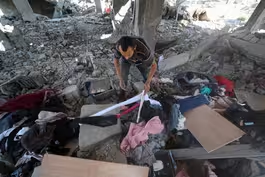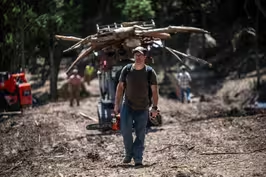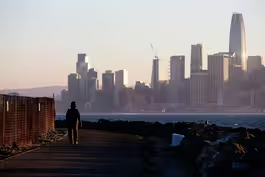
A look at the controversy around ‘Alligator Alcatraz’
Clip: 7/13/2025 | 4m 46sVideo has Closed Captions
A look at the controversy around ‘Alligator Alcatraz’ detention center
This weekend, lawmakers got their first look inside “Alligator Alcatraz,” the makeshift immigration detention center in the Florida Everglades. Rep. Debbie Wasserman Schultz, D-Fla., called the conditions “disturbing and vile,” a description Homeland Security Secretary Kristi Noem challenged. John Yang speaks with Miami Herald reporter Ana Ceballos about the controversy surrounding the facility.
Problems playing video? | Closed Captioning Feedback
Problems playing video? | Closed Captioning Feedback
Major corporate funding for the PBS News Hour is provided by BDO, BNSF, Consumer Cellular, American Cruise Lines, and Raymond James. Funding for the PBS NewsHour Weekend is provided by...

A look at the controversy around ‘Alligator Alcatraz’
Clip: 7/13/2025 | 4m 46sVideo has Closed Captions
This weekend, lawmakers got their first look inside “Alligator Alcatraz,” the makeshift immigration detention center in the Florida Everglades. Rep. Debbie Wasserman Schultz, D-Fla., called the conditions “disturbing and vile,” a description Homeland Security Secretary Kristi Noem challenged. John Yang speaks with Miami Herald reporter Ana Ceballos about the controversy surrounding the facility.
Problems playing video? | Closed Captioning Feedback
How to Watch PBS News Hour
PBS News Hour is available to stream on pbs.org and the free PBS App, available on iPhone, Apple TV, Android TV, Android smartphones, Amazon Fire TV, Amazon Fire Tablet, Roku, Samsung Smart TV, and Vizio.
Providing Support for PBS.org
Learn Moreabout PBS online sponsorshipJOHN YANG: This weekend, lawmakers got their first look inside Alligator Alcatraz, the makeshift immigration detention center in the Florida Everglades.
Florida Democrat Debbie Wasserman Schultz called the conditions disturbing and vile.
REP. DEBBIE WASSERMAN SCHULTZ (D) Florida: This is an appalling, outrageous environment to detain anyone.
This place needs to be shut the hell down.
It needs to be shut down.
JOHN YANG: On NBC's Meet the Press this morning, Homeland Security Secretary Kristi Noem challenged that description.
KRISTI NOEM, Department of Homeland Security: I wouldn't call them jail cells.
I would call them a facility where they are held and that are secure facilities but are held to the highest levels of what the federal government requires.
JOHN YANG: Miami Herald reporter Ana Ceballos is covering the controversy surrounding Alligator Alcatraz.
Ana, just this morning you and your colleagues at the Miami Herald and the Tampa Bay Times published a list about 700 names of detainees who are either at Alligator Alcatraz are scheduled to be sent there.
What's the significance of what you found on that list?
ANA CEBALLOS, The Miami Herald: So the importance of that list is really being able to identify who is in there.
What are their criminal records?
We found that at least more than two hundred and fifty people do not have a criminal conviction or criminal charge pending, but they are there instead for immigration violations.
JOHN YANG: And did you ask the government about that last fact that they don't have charges?
Because the administration has been saying these are the worst of the worst, the evil of the evil?
ANA CEBALLOS: I did.
We shared this list before publication with the Department of Homeland Security as well as with the Florida Division of Emergency Management, which been identified as the state agency that is operating the site.
We did not hear from the state agency, but we did hear from the Department of Homeland Security.
And they said that just because individuals show that they do not have a criminal history does not mean that they may not have committed a crime outside of the country, outside of the United States, or that just them having been in the country illegally is not considered a crime under their lens.
JOHN YANG: And help us understand what exactly we're talking about Alligator Alcatraz.
What's there?
Is this a building?
Are there buildings under construction?
ANA CEBALLOS: Yes.
This is like a makeshift facility really that is built out of tents, heavy Duty tents made to withstand, you know, supposedly really strong winds, although it is unclear as to how strong.
It's also trailers and, you know, portable restrooms and showers.
There's supposed to be legal services on site as well as medical services, but there has a very big disconnect as to the services that are being provided to detainees there in terms of legal access.
Attorneys are having a difficult time contacting them, emailing the facility to set up visitations, to set up secure lines, to talk to their -- to them about their pending cases, in some cases silent cases.
JOHN YANG: And what do detainees who are able to talk to their families and attorneys saying about conditions there?
ANA CEBALLOS: We've been able to talk to a few family members who have been in touch with their loved ones.
They have expressed concern about just, you know, that there's no consistency to the access, again, with attorneys, and there really is no communication from the state as to how to visit or communicate, connect them with their legal counsel.
There's also concerns about showers that they are kind of working on and off or not being able to access them.
Some people went, like, five days without showering.
The toilets at one point were not functioning.
One day they were overflowing.
Some of them have been fixed.
You know, this is a facility that was really opened and built within eight days.
JOHN YANG: Obviously, it's a state facility, but it was certainly promoted by the Trump administration.
Who's calling the shots?
Who's in charge, the federal government or the state government?
ANA CEBALLOS: There has been a lot of confusion about that.
In court filings, the Trump administration has made clear that this is a state facility that is operated by the state.
But the Department of Homeland Security, for example, they were able to confirm that there was a hospital visit earlier this week with some type of medical emergency with one of the detainees.
So there is kind of this limbo, legal limbo, in terms of what exactly this facility is.
The state says that it's not a correctional facility, but they haven't really identified what they consider it to be.
But at the end of the day, these are ICE detainees in a temporary detention facility in the state's control.
JOHN YANG: Ana Ceballos of the Miami Herald, thank you very much.
ANA CEBALLOS: Thank you so much.
How Russia used Brazil as a global espionage ‘spy factory’
Video has Closed Captions
Clip: 7/13/2025 | 6m 43s | How Russia used Brazil as a ‘spy factory’ for global espionage (6m 43s)
News Wrap: Palestinian death toll in Gaza passes 58,000
Video has Closed Captions
Clip: 7/13/2025 | 2m 26s | News Wrap: Palestinian death toll in Gaza passes 58,000, officials say (2m 26s)
Search efforts paused by new threat of flooding in Texas
Video has Closed Captions
Clip: 7/13/2025 | 4m 19s | Texas families face grim reality that some missing from floods may not be found (4m 19s)
Why some of the most populous cities in the U.S. are sinking
Video has Closed Captions
Clip: 7/13/2025 | 5m 12s | ‘Slow motion crisis’: Why some of the most populous cities in the U.S. are sinking (5m 12s)
Providing Support for PBS.org
Learn Moreabout PBS online sponsorshipSupport for PBS provided by:
Major corporate funding for the PBS News Hour is provided by BDO, BNSF, Consumer Cellular, American Cruise Lines, and Raymond James. Funding for the PBS NewsHour Weekend is provided by...















